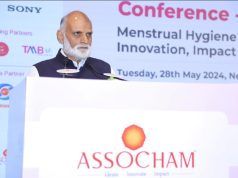Menstrual Hygiene Day 2020: Periods don’t stop for pandemics
Periods take centre-stage, since it’s Menstrual Hygiene Day 2020 tomorrow. May 28 marks this annual day of awareness on MHM (Menstrual Hygiene Management), instituted in the year 2014 by German nonprofit WASH United. Let’s talk #PeriodsInPandemics because #ItsTimeForAction!
Menstrual Hygiene Day 2020
On Menstrual Hygiene Day last year, people around the world organised 726 on-the-ground events in 74 countries. On Menstrual Hygiene Day 2020, people can’t come together in person to publicly challenge the stigma and taboos surrounding menstruation.
Here’s what you can do from home #MHDAY2020:
https://www.instagram.com/p/CAntNSkJuF9/
Being able to manage menstruation hygienically, with confidence and dignity is critical for women’s health. Before the COVID-19 pandemic started, more than 500 million women worldwide did not have what they needed to manage their periods, according to data by FSG (a social change organization). The current pandemic highlights and further exacerbates the menstruation-related challenges many women and girls face around the world.
Period problems during the pandemic
1. Disrupted access to information about menstruation
Schools, community centres and other places where rural women and girls can typically access critical information about menstruation are closed right now. Routine health services are reduced. Women and girls typically have less access to digital information than men hampering their ability to seek information on menstruation through digital channels during lockdown.
2. Persisting period stigma and taboos
Lockdowns intensify the impact of household level taboos and stigmas on women and girls and make it more difficult to manage menstruation, without shame and discomfort in often confined spaces.
3. Disrupted access to products
Many subsidised supply schemes, e.g. free distribution of menstrual products in schools, have been suspended. The economic impact of COVID-19 forces many women and girls to prioritise other basic needs over safe menstrual products. Disrupted supply chains drive prices up, making menstrual products unaffordable for even more women and girls.
4. Lack of access to WASH infrastructure
Millions of women and girls lack access to water, sanitation and handwashing (WASH) facilities to wash themselves, change and dispose of menstrual materials safely and comfortably. Poor WASH (acronym that stands for “water, sanitation and hygiene) infrastructure in healthcare facilities means female health workers and patients can’t manage their menstruation adequately in these locations.
Menstrual Hygiene Day 2020 campaign video:
https://youtu.be/rrzXp6nwZU0












